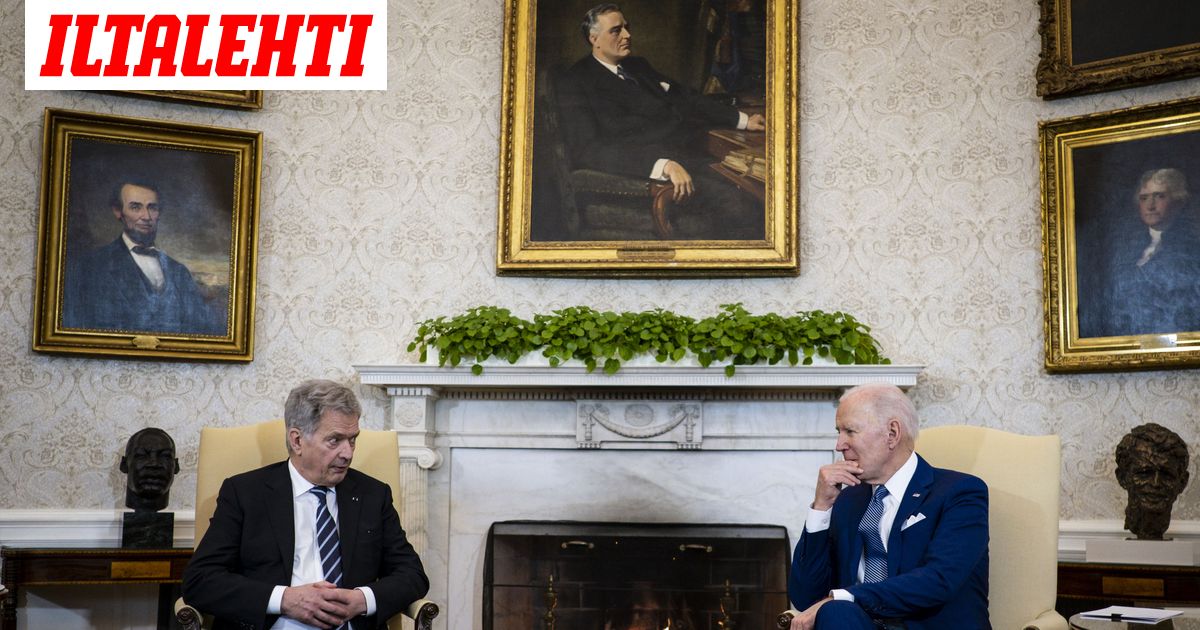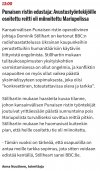Install the app
How to install the app on iOS
Follow along with the video below to see how to install our site as a web app on your home screen.
Note: This feature may not be available in some browsers.
You are using an out of date browser. It may not display this or other websites correctly.
You should upgrade or use an alternative browser.
You should upgrade or use an alternative browser.
Ukrainan konflikti/sota
Nyt kun nämä Pripetin suot sitten mainittu NIIN enpä malta off topiccina olla laittamatta että tuolla juuri oli se kaikkien slaavikansojen alkukoti.Hieno tuo Pripetin suoalue. Mittakaavaa antaa hyvin se, että kun Suomen p-ala on n. 330000m2 niin koko Pripetin laajuus käsittää n. 270000m2. Tästä n. 100000 hyvin vaikeakulkuista maastoa siirrellä raskaampaa kalustoa kuin lintujen tarkkailuun tarkoitettua. Hillitsee hyvin Valkovenäjän intoa lähteä toivioretkelle.
Katso liite: 57964
Meinaan täältä varhaisimmat havainnot slaaviheimoista (roomalainen historioitsija Tacitus ym.). YLE Areenan 'Vanha Venäjä' - radiosarjan tässä jaksossa, ekoilla minuuteilla, asia hyvin tiivistettynä
Kuuntele Yle Areenassa: https://areena.yle.fi/1-50413047
Mahtaakohan jollain Moskovan pojalla tuolla tankin katolla körötellessä käydä mielessä joku dejavuu - fiilis

No se niillä ainakin on verissä tuolla.Mielenkiintoinen tuo serbia. Ehkä ne nahistelee keskenään.
rty19
Greatest Leader
Juu. Firman hommissa fakta ottokalustosta on selvä. Mutta tässä nyt on asialla wanna Be suurvalta, ei pikkuinen Suomi varustamassa suurta malli-cajander reservijoukkoaan....
...suurvalta jonka sodassa kaikki menee suunnitelmien mukaan
Tarkastaja
Kersantti
Kyllä Kiina pelkää markkinoiden kaatumista.Tässä kannattaa ottaa huomioon se, että Kiina pelkää myös länsipakotteita, johtuen siitä, että Kiinan talous on nyt jo poksahtamaisillaan. Mitä tapahtuisi Kiinassa kun bkt ei jatkuvasti kasvaisikaan, saati että talous alkaisi sakkaamaan vielä rajummin - niinpä, tarkottaisi suuria levottomuuksia kiinassa ja Xin hallituksen kaatumista. Joten voidaan unohtaa Kiinan suuri tuki venäläisille.
Bkt ei kasva tarpeeksi vielä pelkillä koti- tai kolmansien maiden kasvavilla markkinoilla.
Unohdat nyt täysin että globaaleilla markkinoilla murica ja eurooppa tuottaa valtavat määrät hyödykkeitä ja komponentteja Kiinassa. Ilman niitä meidän talous sakkaa. Siksi on hyvin vaikea nähdä muita kuin protektionistisia rajoituksia Kiinan suhteen.
Kiinan talous alkaa sakkaamaan myös silloin, kun meillä on epävakaata ja kuluttajat ei käy ostoksilla. Tämän takia siellä ollaan varovaisia konfliktin suhteen, vaikka heillä olis muuten yhteneväiset intressit Venäjän kanssa.
Mitä venäjällä on sitten annettavana Kiinalle.
ihan samoja asioita, kuin meillekkin:
- Öljy
- Kaasu
- Kivihiili
- MALMIT
- Puu
- jne
Noista kilpaillaan jo näinä päivinä.
Siksi Kiina on vielä varovainen kannassaan.
Mitä tulee aloitukseeni, niin en edelleenkään näkis mahdottomana asiana Venäjän varustautumista myöhemmin Kiinassa tuotetulla raudalla. Siellä on tarjolla vaikka jos mitä ja länsivallat ei pysty valvomaan rajan yli käytävää kauppaa. En myöskään näe mahdottomana, että heikko Venäjä menettää osan Siperiasta aikanaan elintilaa tarvitsevalle Kiinalle tavalla tai toisella. Tuolla alkaa oleman pian enemmän Mandariinia puhuvia, kuin Venäläisiä.
Ukraina -ketjuun hyppää OT:n puolelle. Jatketaan keskustelua muualla. MOD siirto jos tarpeen.
Mahdollisesti taas ryssien isompaa upseeria pois pelistä - tällä kertaa kenraali vankina: jos näin, niin eiköhän varmistusta tule asiasta lähiaikoina.

Eversti päässyt ainokaisestaan:
Shadowmon
Kenraali

IL:n tiedot: Välittömät asetoimitukset ja sodan ajan täydennysvarmuus pääaiheina Yhdysvaltain ja Suomen syvenevässä suhteessa
Suomi tavoittelee Yhdysvallat-suhteessaan vahvempaa asemaa kuin käytännön liittolaismailla keskimäärin on läntisen supervallan kanssa.
"Venäjän-uhan vuoksi Puolustusvoimien asevarastoja täydennetään välittömästi. IL:n tietojen mukaan Yhdysvallat on antanut tästä lupauksen.
Tosipaikassa esimerkiksi Ilmavoimilla olisi oltava paljon ohjuksia Hornet-hävittäjiin."

hyvis
Eversti
Äänestivät kuitenkin YK:ssa Venäjää vastaan.No se niillä ainakin on verissä tuolla.
rty19
Greatest Leader
Visegrad-tili kertoo että kyse olisi tällaisesta melko pienestä aluksestaToivottavasti uutinen laivan upotuksesta on totta. Vielä kun olisi sama alus jota kehotettiin painumaan v*ttuun Käärmesaarelta.
Joo, en äkkisiltään tienyyt/muistanut, että Ukrainalla on Smerchiä ja Vilkhasta en ole koskaan kuullutkaan. Mutta joo, samaan kastiin kaukovaikutteisina aseina (tai vaikka kaukovaikutteisena tykistönä ihan miten haluaa nimetä/kuvata) menevät kuin Tochka.Smerchin ja uudemman Vilkhan HE kärkiset raketit yltävät 90km kantamalle. Minkä lisäksi Ukrainan ballistiset lyhyen kantaman ohjukset ovat myös tykistöä. Itsekin RSRAKH:n miehenä olen tykistöä, vaikka aina tykkäänkin mainita eron ballistisen 1,5 tonnia painavan tykistöohjuksen, tai AW kärkisen ohjatun raketin, ja perus putkitykistön 155 fraggi kranun välillä.
In a timely piece via the Association for Computing Machinery (ACM), Sukhov explains how Russian computer science teams are looking at building the next generation of clusters using older clustering technologies and a slew of open-source software for managing everything from code portability to parallelization as well as standards including PCIe 3.0, USB 4, and even existing Russian knock-off buses inspired by Infiniband (Angara ES8430).
Such systems would have to be based on what is readily available from a processing and networking standpoint, which for Russia (and China should it come down to it) have more robust native mobile options.
For some context in terms of the highest end of computing, Russia has seven supercomputers on the Top500 rankings, with 199-node super Chervonenkis its highest ranked at the 19th spot. Chervonenkis is based on AMD Epyc processors with Nvidia A100 accelerators. There isn't much an integrator can do without vital components, including the InfiniBand.
As it turns out, the next three most powerful machines (numbers 36, 40, and 43) are similar configurations with AMD processors and Nvidia accelerators.
"Although these devices are not the most powerful, their production is completely independent and does not affect the patent rights of American or European companies," Sukhov explained.

Russia looks for tech fixes for sanctions-hit HPC sector
Don't send a mobile chip to do a high-end CPU, GPU job. Unless you have no choice.
As he told The Register in a short exchange following the article, "As for the existing supercomputers that have already been put into operation, no special problems are foreseen. These supercomputers are based on Linux and can continue to operate without the support of the companies that supplied the hardware and software. According to my information, so far all scientific supercomputers, including those older than five years old, are operated today in a normal mode. Only forced control commands or hacker attacks can stop them. But such actions in relation to scientific projects, including supercomputers, are not yet known to me."
"Naturally, it will be impossible to make a new supercomputer in Russia in the coming years. Nevertheless, it is quite possible to close all the current needs in computing and data processing using the approach we have proposed. Especially if we apply hardware acceleration to tasks, depending on their type," he adds.
"It should be noted that our proposed approach is intended for rapid implementation as a pilot project. During this implementation, software solutions and new protocols for data exchange, as well as computing technologies, will be worked out.
"In the future, it will be possible to refine the cluster device (for example, to try to launch the release of a new motherboard, which will host several chips connected by a common bus)."
Noo tuohan näyttää uudelta joten parempi tuo pohjassa kuin savuttava 1960-luvun neuvostopaatti.Visegrad-tili kertoo että kyse olisi tällaisesta melko pienestä aluksesta
In better times, Ukrainian drone enthusiasts flew their gadgets into the sky to photograph weddings, fertilize soybean fields or race other drones for fun. Now some are risking their lives by forming a volunteer drone force to help their country repel the Russian invasion.
“Kyiv needs you and your drone at this moment of fury!” read a Facebook post late last week from the Ukrainian military, calling for citizens to donate hobby drones and to volunteer as experienced pilots to operate them.
One entrepreneur who runs a retail store selling consumer drones in the capital said its entire stock of some 300 drones made by Chinese company DJI has been dispersed for the cause. Others are working to get more drones across the border from friends and colleagues in Poland and elsewhere in Europe.
“Why are we doing this? We have no other choice. This is our land, our home,” said Denys Sushko, head of operations at Kyiv-based industrial drone technology company DroneUA, which before the war was helping to provide drone services to farmers and energy companies.
Sushko fled his home late last week after his family had to take cover from a nearby explosion. He spoke to The Associated Press by phone and text message Friday after climbing up a tree for better reception.

Ukrainian drone enthusiasts sign up to repel Russian forces
In better times, Ukrainian drone enthusiasts flew their gadgets into the sky to photograph weddings, fertilize soybean fields or race other drones for fun.
Four top global consultancies, all with big IT practices, have quit Russia.
PwC on Sunday decided that Russia's invasion of Ukraine means it "should not have a member firm in Russia and consequently PwC Russia will leave the network."
KPMG also chose Sunday for its announcement, which it argued was necessary because "We believe we have a responsibility, along with other global businesses, to respond to the Russian government's ongoing military attack on Ukraine."
The firm's Russia and Belarus outposts will leave the KPMG network. "KPMG has over 4,500 people in Russia and Belarus, and ending our working relationship with them, many of whom have been a part of KPMG for many decades, is incredibly difficult," the firm's statement reads, adding "This decision is not about them – it is a consequence of the actions of the Russian government. We are a purpose-led and values-driven organization that believes in doing the right thing."
Staff will be offered "transitional support".
The two consultancies' decisions to quit Russia follow similar moves last week by Accenture (on March 3) and DXC (March 4th).
The four firms collectively employed 14,500 people in Russia and Belarus.

Global consultancies quit Russia
KPMG and PwC follow DXC and Accenture, leaving 14,500 staff – probably – without a gig
Saattaa koskea myös suomalaisia.
Kenraali? Tai Kenraalimajuri.Mahdollisesti taas ryssien isompaa upseeria pois pelistä - tällä kertaa kenraali vankina: jos näin, niin eiköhän varmistusta tule asiasta lähiaikoina.

" Aerospace Force Main Command Major-General Oleg Makovetsky
Venäjällä kenraaleita riittää, mutta nyt on sotilastiedustelulle kyllä jättipotti.
Vahvasti epäilen uutista, miten tuo olisi edes mahdollista...?
Viimeksi muokattu:
jtsaari2004
Eversti
Erittäin epäselvää mitä merkitsee. Omistukset ja toiminnot osin paikallisessa omistuksessa. Mutta rikkaa rokkaan!
Global consultancies quit Russia
KPMG and PwC follow DXC and Accenture, leaving 14,500 staff – probably – without a gigwww.theregister.com
Saattaa koskea myös suomalaisia.

